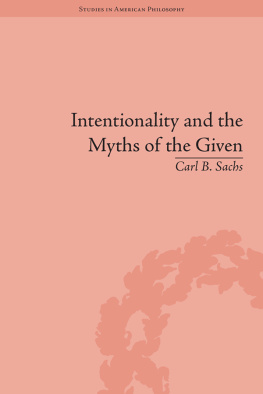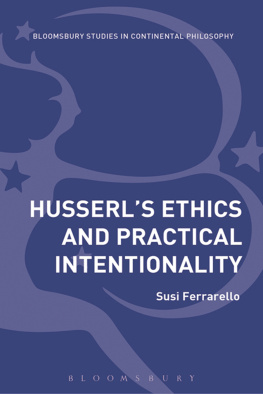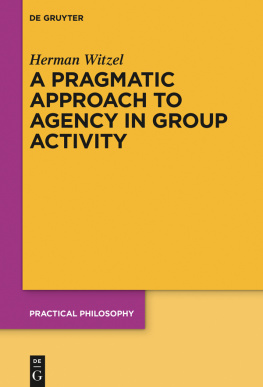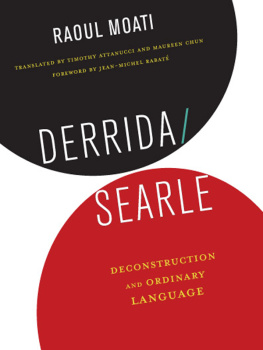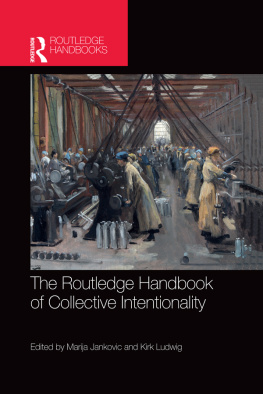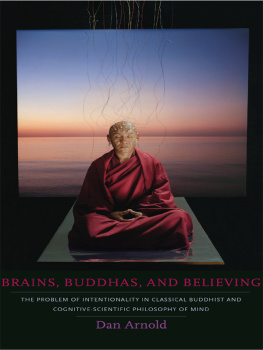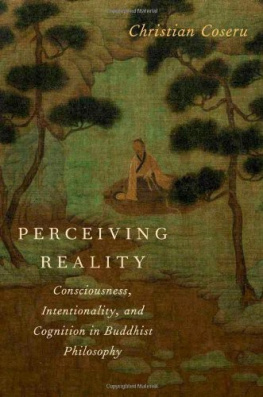INTENTIONALITY AND THE MYTHS OF
THE GIVEN: BETWEEN PRAGMATISM AND
PHENOMENOLOGY
STUDIES IN AMERICAN PHILOSOPHY
Series Editors:Willem deVries
Henry Jackman
FORTHCOMING TITLES
Richard Rorty, Liberalism and Cosmopolitanism
David E. McClean
INTENTIONALITY AND THE MYTHS OF
THE GIVEN: BETWEEN PRAGMATISM AND
PHENOMENOLOGY
BY
Carl B. Sachs
First published 2014 by Pickering & Chatto (Publishers) Limited
Published 2016 by Routledge
2 Park Square, Milton Park, Abingdon, Oxon OX14 4RN
711 Third Avenue, New York, NY 10017, USA
Routledge is an imprint of the Taylor & Francis Group, an informa business
Taylor & Francis 2014
Carl B. Sachs 2014
To the best of the Publishers knowledge every effort has been made to contact
relevant copyright holders and to clear any relevant copyright issues.
Any omissions that come to their attention will be remedied in future editions.
All rights reserved, including those of translation into foreign languages. No part of this book
may be reprinted or reproduced or utilised in any form or by any electronic, mechanical, or
other means, now known or hereafter invented, including photocopying and recording, or in
any information storage or retrieval system, without permission in writing from the publishers.
Notice:
Product or corporate names may be trademarks or registered trademarks, and
are used only for identification and explanation without intent to infringe.
BRITISH LIBRARY CATALOGUING IN PUBLICATION DATA
Sachs, Carl B., author
Intentionality and myths of the given: between pragmatism and phenomenology. (Studies in American philosophy)
1. Intentionality (Philosophy) 2. Sellars, Wilfrid 3. Lewis, Clarence Irving, 18831964. 4. Merleau-Ponty, Maurice, 190861
I. Title II. Series
128.2-dc23
ISBN-13: 978-1-84893-507-5 (hbk)
Typeset by Pickering & Chatto (Publishers) Limited
CONTENTS
The concept behind this book was conceived a long time ago, and has developed over the last ten years. I first became interested in the general problem of whether normativity and naturalism could be reconciled. Was it possible, I thought, be both a Kantian and a Darwinian? My first exploration of that question led to a sustained interest in Nietzsche, which somehow became a dissertation. After finishing graduate school my research led me first to Dewey and then to Sellars. Merleau-Ponty, whom I encountered in a seminar led by Fred Olafson in my first year of graduate school, was never far from my concerns. The present work might be conceived as my Habilitationschrift, and I have many people to thank for their support and help in bringing it finally to full term.
First, my profoundest gratitude to my mentor in all things Sellarsian, Willem deVries. Bill patiently guided me through every stage of the process, including encouraging me to write a book in the first place, suggesting that I take it to Pickering & Chatto for their Studies in American Philosophy series, reading every chapter with exacting criticisms, and answering every frantic email. We have finally ended up agreeing to disagree on many issues, but I shudder to think how much worse the book would have been if not for his advice and criticisms. I would also like to extend my appreciation and thanks to Bills co-editor in the Studies in American Philosophy series, Henry Jackman.
Second, a different kind of gratitude must go to Mark Lance and Bill Blattner at Georgetown University. They agreed to sponsor me as a Sponsored Researcher at Georgetown for 201314, discussed many ideas with me, and went out of their way to make me feel included in the department. Mark also read much of the manuscript and offered a tremendous amount of criticism and encouragement. Special thanks is also due to Wayne Davis, the chair of the GU philosophy department, for his role in making my position at GU possible.
Third, my philosophical community. As someone who works in the rich intersections of analytic philosophy, Continental philosophy, and pragmatism, I am blessed with a wide array of outstanding philosophical interlocutors around the world. Of them, four deserve special commendation: Maureen Eckert, Steve Levine, Pete Olen and Aaron Schiller. Maureen patiently listened to every idea I ever had and constantly pushed me to be both more creative and more rigorous. Steve introduced me to Sellars in 2007, and I vividly recall an afternoon spent with Steve wandering around Prague in May 2011 where we hashed out the central ideas that formed the nucleus of this book. Pete and I have corresponded regularly about both Lewis and Sellars and I have invariably been impressed with his forceful criticisms of my views, particularly as they bear on the history of philosophy. Aaron, with whom Bill and I co-founded the Sellars Society in 2012, introduced me to the work of McDowell when we were graduate students together. I am in the profoundest debt to all of them, and to many more as well.
Fourth, I would like to thank Stephanie Hutchison for the extraordinary effort and dedication she has shown in closely reading the manuscript for grammar and style, and for her immensely helpful criticisms on how to make the book more accessible to those not completely immersed in these issues.
Fifth, my heartfelt gratitude to Sophie Rudland, Commissioning Assistant at Pickering & Chatto for Economics and Philosophy, for her continual feedback and support, for gently keeping me on deadline (more or less), and for her role in guiding the miraculous transformation of the manuscript into a book.
Lastly, my parents, who generously agreed to support me while living in Washington, D.C. Without their uncompromising love and support, I would never have dared to become a philosopher and would never have dared to write this book. To my mother Kathie Beck Sachs, who has the heart of a poet, and my father Donald H. Sachs, who has the mind of a psychologist, this book is lovingly dedicated. The following chapters and sections draw upon material from my previously published works:
, section 2: McDowells Transcendental Empiricism draws upon both C. Sachs, The Shape of a Good Question: McDowel, Evolution, and Transcendental Philosophy, The Philosophical Forum, 42:1 (2011), pp. 6178, and C. Sachs, Resisting the Disenchantment of Nature: McDowell and the Question of Animal Minds, Inquiry, 55:2 (2012), pp. 13147.
, section 1: Myths of the Given and Transcendental Friction both draw upon C. Sachs, Discursive and Somatic Intentionality: Merleau-Ponty contra Sellars or McDowell, International Journal of Philosophical Studies, 22:2 (2014), pp. 199227.
INTRODUCTION: WHY A NEW ACCOUNT OF
INTENTIONALITY?
Looking back on what is now canonized as twentieth-century philosophy, it is tempting to think that the problematic of intentionality is a persistent preoccupation, often implicit even where it is not made explicit. Many of the most prominent philosophers on both sides of the Atlantic devoted themselves to such questions as, what is the aboutness of thought and perception? How can anything material or physical exhibit intentional states? Can intentional states be modeled or duplicated on a machine? What about animals and babies? The problem of intentionality made its appearance for the twentieth century with Franz Brentano, was refined and reformulated by major figures of both analytic (Ryle, Chisholm, Sellars, Brandom, Dennett) and Continental persuasions (Husserl, Heidegger, Merleau-Ponty), and has continued today as a central focus of discussion about naturalism and its limits. While a few prominent philosophers (such as Richard Rorty) have denied that intentionality marks out anything ontologically, epistemologically, or methodologically distinctive, it is fair to say that most philosophers have been unable to fully dispense with the suspicion, or intuition, that there has got to be

